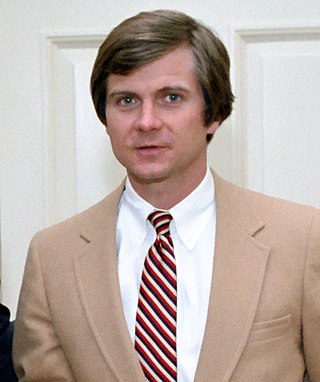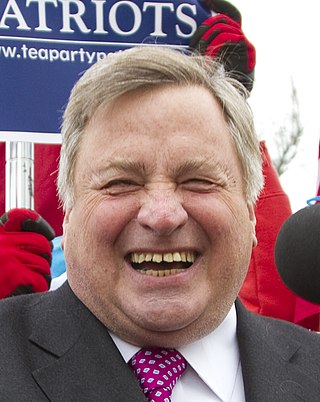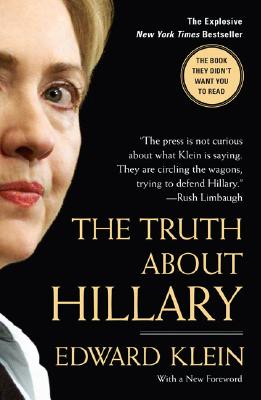Related Research Articles

William Jefferson Clinton is an American lawyer and politician who served as the 42nd president of the United States from 1993 to 2001. A member of the Democratic Party, he previously served as governor of Arkansas from 1979 to 1981 and again from 1983 to 1992. Clinton, whose policies reflected a centrist "Third Way" political philosophy, became known as a New Democrat.

David Jeffrey Frum is a Canadian-American political commentator and a former speechwriter for President George W. Bush. He is a senior editor at The Atlantic as well as an MSNBC contributor. In 2003, Frum authored the first book about Bush's presidency written by a former member of the administration. He has taken credit for the famous phrase "axis of evil" in Bush's 2002 State of the Union address, and he is considered a voice in the neoconservative movement.

Harvey LeRoy "Lee" Atwater was an American political consultant and strategist for the Republican Party. He was an adviser to Republican U.S. presidents Ronald Reagan and George H. W. Bush and chairman of the Republican National Committee. Atwater aroused controversy through his aggressive campaign tactics, especially the Southern strategy.
Compassionate conservatism is an American political philosophy that stresses using conservative techniques and concepts in order to improve the general welfare of society. The philosophy supports the implementation of policies designed to help the disadvantaged and alleviate poverty through the free market, envisaging a triangular relationship between government, charities and faith-based organizations. The term entered mainstream parlance between 2001 and 2009, during the administration of US President George W. Bush. He used the term often to describe his personal views and embody some parts of his administration's agenda and policy approach.
Harry Zell Thomason is an American film and television producer and director, best known for the television series Designing Women. Thomason and his wife, Linda Bloodworth-Thomason, are close friends of President Bill Clinton and U.S. Secretary of State Hillary Clinton, and played a major role in President Clinton's election campaigns.
"Vast right-wing conspiracy" is a phrase popularized by a 1995 memo by political opposition researcher Chris Lehane and then referenced in 1998 by the then First Lady of the United States Hillary Clinton, in defense of her husband, President Bill Clinton, characterizing the continued allegations of scandal against her and her husband, including the Lewinsky scandal, as part of a conspiracy by Clinton's political enemies. The term has been used since, including in a question posed to Bill Clinton in 2009 to describe verbal attacks on Barack Obama during his early presidency. Hillary Clinton mentioned it again during her 2016 presidential campaign.
The Hunting of the President is a 2004 English-language documentary film about former US President Bill Clinton. Clinton and his wife Hillary Clinton appear in archived footage. The film is based on the book The Hunting of the President: The Ten Year Campaign to Destroy Bill and Hillary Clinton, written by investigative journalists Joe Conason and Gene Lyons, and published by Thomas Dunne Books in 2000. Narrated by Morgan Freeman, the film premiered at the 2004 Sundance Film Festival.

Richard Samuel Morris is an American author, commentator, and former political consultant.

Sidney Stone Blumenthal is an American journalist, political operative, and Lincoln scholar. A former aide to President Bill Clinton, he is a long-time confidant of Hillary Clinton and was formerly employed by the Clinton Foundation. As a journalist, Blumenthal wrote about American politics and foreign policy. He is also the author of a multivolume biography of Abraham Lincoln, The Political Life of Abraham Lincoln. Three books of the planned five-volume series have already been published: A Self-Made Man, Wrestling With His Angel, and All the Powers of Earth. Subsequent volumes were planned for later.
Edward J. Klein is an American author and former foreign editor of Newsweek, former editor-in-chief of The New York Times Magazine (1977–1987). He has written about the Kennedys, Bill Clinton, Hillary Clinton, Barack Obama, Michelle Obama, and Donald Trump.

The Truth About Hillary: What She Knew, When She Knew It, and How Far She'll Go to Become President is a controversial political biography about Hillary Clinton, then a Democratic senator from New York, written by Edward Klein, the former editor of The New York Times Magazine.
Gene Lyons is an American political columnist who has defended President Bill Clinton.
This is a list of books and scholarly articles by and about Hillary Clinton, as well as columns by her.

Political Fictions is a 2001 book of essays by Joan Didion on the American political process.
Joshua Green is an American journalist who writes primarily on United States politics. He is currently the senior national correspondent at Bloomberg Businessweek. He is a weekly columnist for The Boston Globe and his work has also appeared in The Atlantic.
Susan P. Thomases is a New York-based attorney. She served as personal counsel and an informal adviser to Hillary Clinton during the presidency of Bill Clinton. She was a prominent witness during the Senate Whitewater Hearings in 1995. She served as the model for the character Lucille Kaufmann from the 1996 political novel Primary Colors.
"Clinton crazies" is a pejorative term in American politics of the 1990s and later that refers to intense criticism of United States President Bill Clinton and his wife Hillary Clinton. The phrase refers to Clinton opponents who, according to Clinton supporters, "systematically ... sought to undermine this president with the goal of bringing down his presidency and running him out of office; and that they have sought non‐electoral means to remove him from office." Such intensity of feeling existed throughout the Clinton years, leading commentators to wonder what was at the root of it. The term was especially used in reference to people and media outlets that focused on all manner of Clinton scandals and controversies, some of which had substance behind them and some of which did not.
The post-presidency of Bill Clinton began on January 20, 2001 following the end of Clinton's second term as president. Clinton was the 42nd president of the United States, serving from 1993 to 2001. After he left office, he continued to be active in the public sphere, touring the world, writing books, and campaigning for Democrats, including his wife, Hillary Clinton, who served as the junior U.S. senator from New York between 2001 and 2009 and the 67th United States Secretary of State between 2009 and 2013, on her presidential campaigns in 2008, in which she was runner-up for the Democratic nomination, and in 2016, when she lost the election to Donald Trump. After Clinton left office, he ended up forming a close friendship with George H. W. Bush and Barbara Bush, and later, with their son George W. Bush.

The Reagan era or the Age of Reagan is a periodization of recent American history used by historians and political observers to emphasize that the conservative "Reagan Revolution" led by President Ronald Reagan in domestic and foreign policy had a lasting impact. It overlaps with what political scientists call the Sixth Party System. Definitions of the Reagan era universally include the 1980s, while more extensive definitions may also include the late 1970s, the 1990s, and even the 2000s. In his 2008 book, The Age of Reagan: A History, 1974–2008, historian and journalist Sean Wilentz argues that Reagan dominated this stretch of American history in the same way that Franklin D. Roosevelt and his New Deal legacy dominated the four decades that preceded it.
This bibliography of Bill Clinton is a selected list of generally available published works about Bill Clinton, the 42nd president of the United States. Further reading is available on Bill Clinton, his presidency and his foreign policy, as well as in the footnotes in those articles.
References
- ↑ Profile, google.com; accessed August 17, 2016.
- ↑ "Joe Conason, Author at The National Memo". The National Memo. Retrieved 2016-08-17.
- ↑ "Joe Conason". Observer. Retrieved 2016-08-17.
- ↑ "Stories written by Joe Conason" . Retrieved 2016-08-17.
- 1 2 3 "About Joe Conason". creators.com. Retrieved 2016-08-17.
- ↑ "Joe Conason". Simon & Schuster. Retrieved 2016-08-17.
- 1 2 Beauchamp, Zack (2024-04-06). "The right-wing scammers who paved the way for Trump". Vox. Retrieved 2024-10-25.
- 1 2 Pengelly, Martin (2024-07-06). "'Stealing with both hands': veteran reporter Joe Conason details the right wing's graft". The Guardian. ISSN 0261-3077 . Retrieved 2024-10-25.
- 1 2 "The Con at the Core of the Republican Party". The New Republic. ISSN 0028-6583 . Retrieved 2024-10-25.
- 1 2 "Buy these must-read books on politics and history". NBC News. 2024-10-14. Retrieved 2024-10-25.
- 1 2 Yorker, The New (2024-03-22). "The Political Books That Help Us Make Sense of 2024". The New Yorker. ISSN 0028-792X . Retrieved 2024-10-25.
- 1 2 "How conservatives grew to 'milk their constituents for every penny'". MSNBC.com. Retrieved 2024-10-25.
- ↑ Kisch, Guido (1942-01-01). Historia Judaica.
- ↑ Avrich, Paul (2005). Anarchist Voices: An Oral History of Anarchism in America. AK Press. pp. 308–309. ISBN 1904859275.
- ↑ "Couple's Long Career Culminates in Festival", The New York Times , December 13, 1992.
- ↑ "About Joe Conason". creators.com. Retrieved 2016-08-18.
- 1 2 "About Joe Conason". www.creators.com. Retrieved 2016-08-23.
- ↑ "Joe Conason profile". The Nation. 2010-04-02. Retrieved 2016-08-17.
- ↑ "Joe Conason, Columnist". truthdig.com. Retrieved 2016-08-17.
- ↑ "Our Editors". www.theinvestigativefund.org. Retrieved 2016-08-17.
- ↑ "Joe Conason, Coming to an Inbox Near You". 23 August 2011. Retrieved 2016-08-18.
- ↑ "About - The National Memo - Smart. Sharp. Funny. Fearless" . Retrieved 2016-08-18.
- ↑ "The National Memo". The National Memo. Retrieved 2016-08-18.
- ↑ "Spy". Books.google.com. pp. 31–38. Retrieved January 17, 2016.
- ↑ Salon Staff (18 February 2004). "Joe Conason". Salon. Retrieved 2016-08-18.
- ↑ Conason, Joe (2000-02-01). "I. The George W. Bush success story". Harper's Magazine. ISSN 0017-789X . Retrieved 2016-08-23.
- ↑ "Bush's Tangled Past Is Relevant Today". The New York Observer . 2002-07-29. Retrieved 2016-08-23.
- ↑ "The Harken Energy Distraction". Washington Post. Retrieved 2016-08-23.
- ↑ Lyons, Gene; Conason, Joe (2001-02-03). The Hunting of the President: The Ten-Year Campaign to Destroy Bill and Hillary Clinton (1st ed.). New York: St. Martin's Griffin. ISBN 9780312273194.
- ↑ "Joe Conason". IMDb. Retrieved 2016-08-18.
- 1 2 Conason, Joe (2003-09-01). Big Lies: The Right-Wing Propaganda Machine and How It Distorts the Truth (1st ed.). Thomas Dunne Books. ISBN 9780312315603.
- ↑ "Esquire". archive.esquire.com. December 2005. Retrieved 2016-08-23.
- ↑ "Table of Contents: The best American political writing 2006 /". www.buffalolib.org. Retrieved 2016-08-23.
- ↑ Conason, Joe; Franken, Al; Roosevelt, James Jr. (2005-10-01). The Raw Deal: How the Bush Republicans Plan to Destroy Social Security and the Legacy of the New Deal. Sausalito, CA: Polipoint Press. ISBN 9780976062127.
- ↑ Conason, Joe (19 February 2007). "It could happen here". Salon. Retrieved 2016-08-23.
- ↑ ""The Hunting of Hillary" by Joe Conason & Gene Lyons". hillarybook.nationalmemo.com. Retrieved 2016-08-23.
- ↑ "The Hunting of Hillary: A conversation with Joe Conason" . Retrieved 2016-08-23.
- ↑ Conason, Joe (2016-09-13). Man of the World. Simon and Schuster. ISBN 9781439154106.
- 1 2 "Joe Conason, Author at The National Memo". The National Memo. Retrieved 2016-08-23.
- ↑ "Elizabeth Wagley, Joe Conason". The New York Times. 13 October 2002.